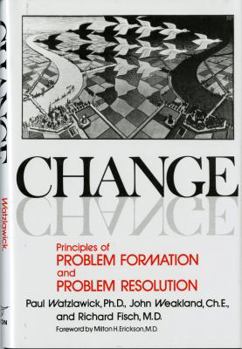Change: Principles of Problem Formation and Problem Resolution
Select Format
Select Condition 
Book Overview
This classic book, available in paperback for the very first time, explores why some people can successfully change their lives and others cannot. Here famed psychologist Paul Watzlawick presents what is still often perceived as a radical idea: that the solutions to our problems are inherently embedded in the problems themselves. Tackling the age-old questions surrounding persistence and change, the book asks why problems arise and are perpetuated in some instances but easily resolved in others. Incorporating ideas about human communication, marital and family therapy, the therapeutic effects of paradoxes and of action-oriented techniques of problem resolution, Change draws much from the field of psychotherapy.
Format:Hardcover
Language:English
ISBN:0393011046
ISBN13:9780393011043
Release Date:April 1974
Publisher:W. W. Norton & Company
Length:192 Pages
Weight:0.87 lbs.
Dimensions:0.9" x 5.9" x 8.5"
Customer Reviews
5 ratings
Mindboggling!
Published by Thriftbooks.com User , 21 years ago
This is a great book on the mind. It shows us that we don't really need to know the mechanisms of things to make it work. Just like we don't have to know how a car works in order to drive it. The mind is the same way. Never mind the mechanisms it involves but if you do this and this, a person will do this and this. And surprisingly, although most of the suggestions are counterintuitive, most of the things discussed in the book actually work when we try it out on others. Try it and you will see! If you want to know why these things work, I'd suggest you read "The Ever-Transcending Spirit" by Toru Sato. It is a very insightful book about relationships and consciousness. If you get the message, you will know why the things suggested in Watzlawick's books actually work. Happy reading!
Plus ca change, plus c'est la meme chose
Published by Thriftbooks.com User , 23 years ago
Knowing the difference between first-order change, and second-order change can change your life! See if you can figure this out: "It obviously makes as difference whether we consider ourselves as pawns in a game whose rules we call reality or as players of the game who know that rules are 'real' only to the extent that we have created or accepted them, and that we can change them." This is pretty much what this book is about. And this, "When a person enters therapy, he is fully entrenched in a dilemma: what he wishes to attain has become all the more important and urgent ... and because of this urgency it is all the more important that no risk of falure be involved in the eventual action." Complex stuff. I read it once, and now I'm back to read it again. It's hard to absorb it all the first time even though you know you're reading some pretty radical stuff that you probably ought to be acting upon!
A practical extension of Bateson's ideas...
Published by Thriftbooks.com User , 23 years ago
Watzlawick and friends give a quick introduction into their ideas of the philosophy behind change and it why we sometimes have problems with it. They have taken Bateson's early work where he drew an analogy between Russell's logical types and the problems of communication between people.I found the authors' excerpts from various therapy sessions to be quite interesting and they obviously have a great deal of practical experience in this type of therapy. Their overviews of the context of some patients also helps strengthen their ideas regarding problems, change and the reason we often have difficulty changing situations even though we would really like to.The only shortcoming is the lack of ideas for accomplishing change. They present some possible avenues but after all of Wilber's books I think we could stand a new edition of this book that would encompass other methods of therapy. The authors also could have done a bit more work contextualizing their results based on the fact that they were involved in "brief" therapy - that is, they had a definite time limit on sessions with patients so they had to come up with different ideas.Highly recommended.
I've wondered why Logical Change fails. - Now I Know
Published by Thriftbooks.com User , 24 years ago
Over the last 15 years I have been involved with organizations undergoing major change. For all of those years I have tried to discover why change, that appears so essential to these companies, fails most of the time. I have searched for years for a logical answer.I happend to notice the title of this book at a donated book sale at our local library.... I picked it and others up and proceeded to add it to the pile of books I would some day scan. On a long business flight I started to read this book.I could not stop. As the authors laid out their ideas I covered the pages with notes. Finaly a logical explanation of why change, even obviously necessary change, fails. Even more the begining of a method on how to make it work.
Brilliant analysis of the nature of change
Published by Thriftbooks.com User , 26 years ago
The way we think and act, how we become fixed with certain patterns, how we often view ourselves and our world - all of these are analysed in this magnificent book. No pseudo-theories, just some of the brightest ideas I've ever come across.





